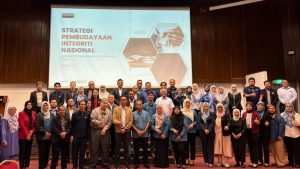As noted by the New York Times in early April, there have been more than 110 reported cases of blatant anti-Asian hate crimes in the United States since March 2020, which ranged from physical and verbal assaults to acts of vandalism.
As both Muslim and Asian, I monitor these global trends while simultaneously trying to reclaim misappropriated terms from my faith culture as a means of countering rampant Islamophobia across the globe.
Anti-Asian hate and Islamophobia emerge from the politics of othering and dehumanization, upon which white supremacy and other systems of oppression are built and proliferate.
With this context in mind, there are lessons from my religious tradition to better understand an individual’s role to counter hate and build peace.
‘Jihad’ is an overused buzzword on Western media platforms, that has been misappropriated, decontextualized and far removed from the essence of its calling.
Beyond some sort of holy war, jihad can be understood as the act of (re)solving conflicts without violence. The term jihad directly translates to ‘struggle’ or ‘striving,’ which is a daily practice of self-accountability and improvement, as well as preservation from the ill (not engaging in a life of vice).
It is to enjoin in what is good and forbid what is bad. The ethics of what is good or bad are up for debate – though most of us would agree that nothing good or just comes out of racism. In the pursuit of enjoining the good and forbidding the bad is how jihad relates to ‘bystander intervention.’
Bystander intervention is a call-to-action for everyone to be responsible and thoughtful, and to intervene and de-escalate a situation when an injustice – or various forms of harassment and/or violence – is happening.
There are a few caveats. It is always good to ask if the person being harassed needs your assistance and, if concerned about your own safety while intervening, try requesting support from others close by.
Hollaback!, a globally oriented platform to end harassment in all its forms, has developed five popular methods of intervening that they call the 5Ds. They are to distract, delegate, document, delay and direct.
To distract is to pull away the attention of the perpetrator from their target, and this can be done in a variety of ways, such as pretending to be lost and asking the target for directions, pretending to know the target and mention to go elsewhere to have a catch-up session, randomly singing a nursery rhyme aloud, or even standing in between the perpetrator and the target in and act of subtle strategic ‘blocking’, to break the visual contact between them.
To delegate is to seek help from people in positions of authority (like teachers, security guards, transit employees, or store supervisors) and other bystanders in asking if they are willing to lend a hand in intervening together.
To document is to video record the incident taking place, only when there are already others who are trying to intervene (if not, use one of the other 4Ds). Be sure to keep a safe distance, and mention the time, date, and location of the recording. Once the situation has de-escalated, ask the target what they would like to do with the clip.
To delay is to check-in with the targeted person upon an incident, and empathize with them for what had happened, and ask what can be done to support them. It is important to let them know that they are not alone.
To direct is to speak up against the perpetrator, often only upon assessing the safety levels of the situation. Let them know what they are doing is unjust/wrong and to leave the target alone, setting a firm boundary in a short and succinct manner. Then, shift focus onto the target to see how they are doing and ask how best to show your care and support.
Essentially, bystander intervention is the act of inserting oneself into a harassment incident by supporting and comforting the targeted person(s), while keeping the harasser/perpetrator at bay.
An excellent example of a successful intervention is the case of Raymond Hing, a 21-year-old Singaporean man who was assaulted in the UK in April. A British YouTuber only known as Sherwin, happened to have been venturing around the area while live-streaming.
He took notice of the unfolding incident and intervened without hesitation. Sherwin rushed to Hing’s side and shouted repeatedly, “Leave him alone!” then proceeded to block the aggressor from getting a hold of Hing.
Sherwin’s actions caused the assailant to flee the scene, and the police were contacted shortly after. Hing’s life was potentially saved, since the aggressor had initially pulled out a knife on him.
The recording of the incident went viral on YouTube and has inspired many to be more proactive, should they find themselves in a similar situation.
Learning about bystander intervention had motivated and resonated with me deeply, particularly reminding me of a hadith, or prophetic teaching in Islam:
“Whosoever of you sees an evil, let him change it with his hand; and if he is not able to do so, then [let him change it] with his tongue; and if he is not able to do so, then with his heart – and that is the weakest of faith.”
The ‘hand’ being action in this hadith is to physically change or undo an injustice (with the prophetic wisdom of approaching situations with nonviolence); the ‘tongue’ being speech, is to call out an injustice as it is, and share reminders for justice and provide advice accordingly; and “heart” being intention, is to take the occurrence (even if you are only a non-intervening bystander witnessing it) as a reminder to not propagate such an injustice further, learning from it, and striving to be better.
Excellence, or “ehsan” is to do all three in harmony. When standing up against an injustice, intention, or ‘niyyah’ is another important element, as the centering should be toward those that are being wronged/oppressed, rather than seeking glory or heroism.
This is reminded through another hadith: “The reward of deeds depends upon the intentions and every person will get the reward according to what he has intended.”
What others ultimately do may be out of our control, yet how we choose to respond is very well within our capacity. There is no conflict nor disconnect between faith practices and daily life.
The act of jihad exists in the everyday: in going to work, furthering our studies, creating a healthy family, and even in bystander-intervention – as within it all we are striving. Striving to improve the quality of life for ourselves and others around us.
As these teachings suggests, contrary to misrepresented depictions in Western media, my religious tradition has much wisdom to offer regarding how to counter hate and build peace.
Adam Arman graduated from Portland State University in December 2019, as an undergrad studying conflict resolution, and writing (poetry). He has recently completed an internship with War Prevention Initiative in the United States of America.
Resources:
https://www.nytimes.com/interactive/2021/04/03/us/anti-asian-attacks.html
https://www.huffpost.com/entry/the-real-meaning-of-the-word-jihad_n_56f2d97fe4b0c3ef521798b3
https://www.ihollaback.org/bystander-resources/
https://www.youtube.com/watch?v=mt7X5tjp9Js&ab_channel=Vyond
https://www.youtube.com/watch?v=nzFt8QOZN1I&ab_channel=TODAYonline








